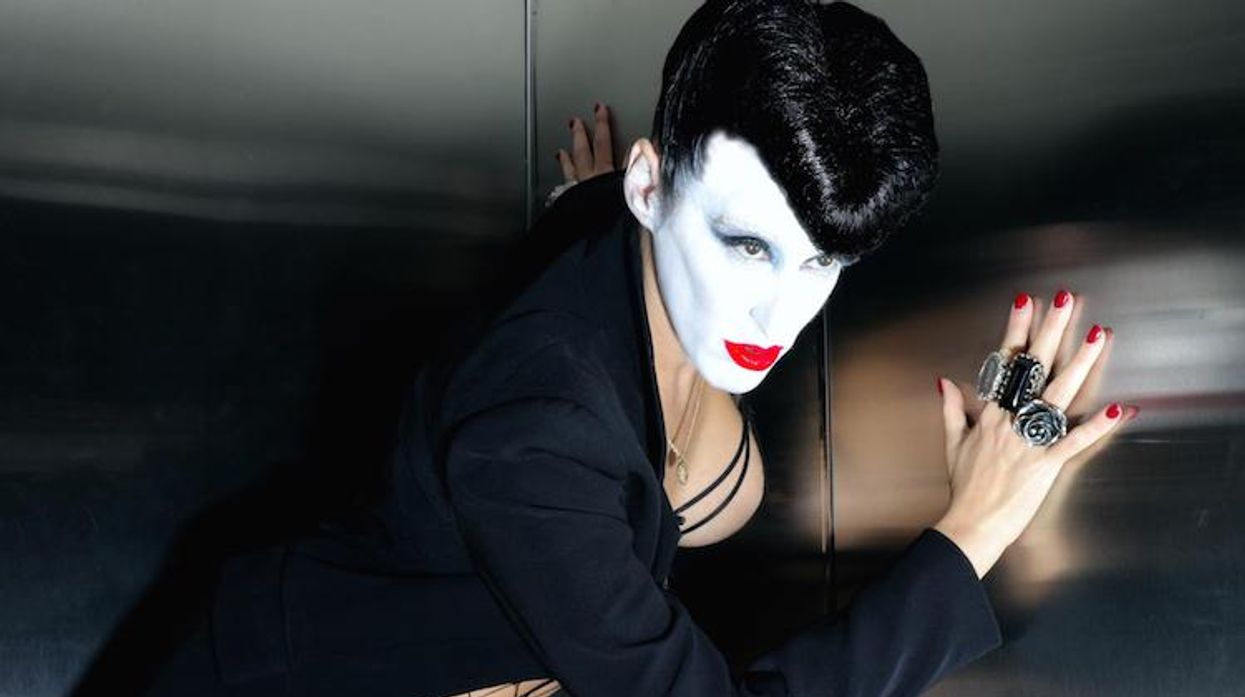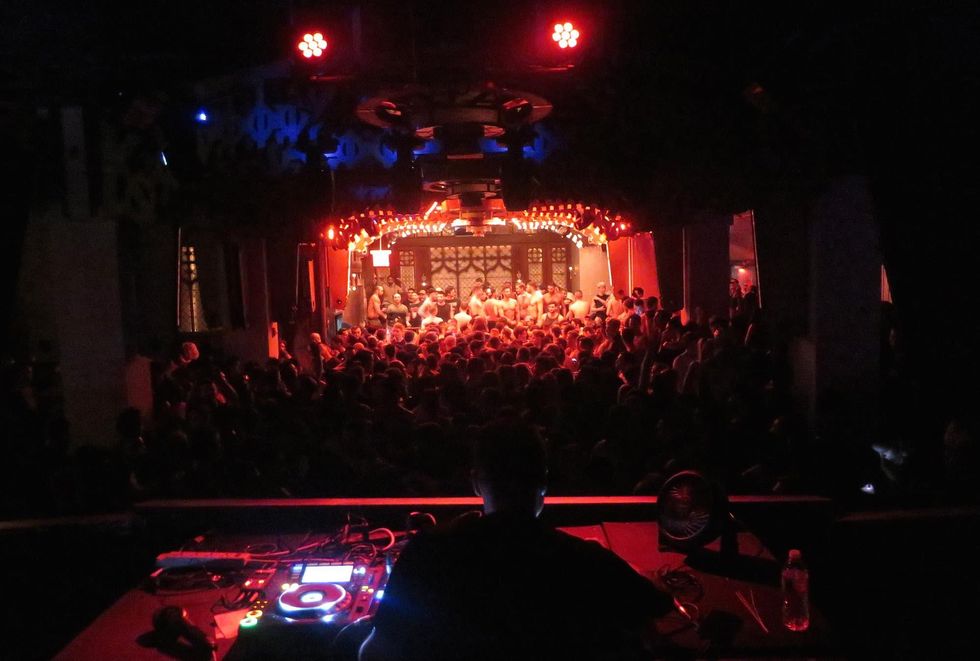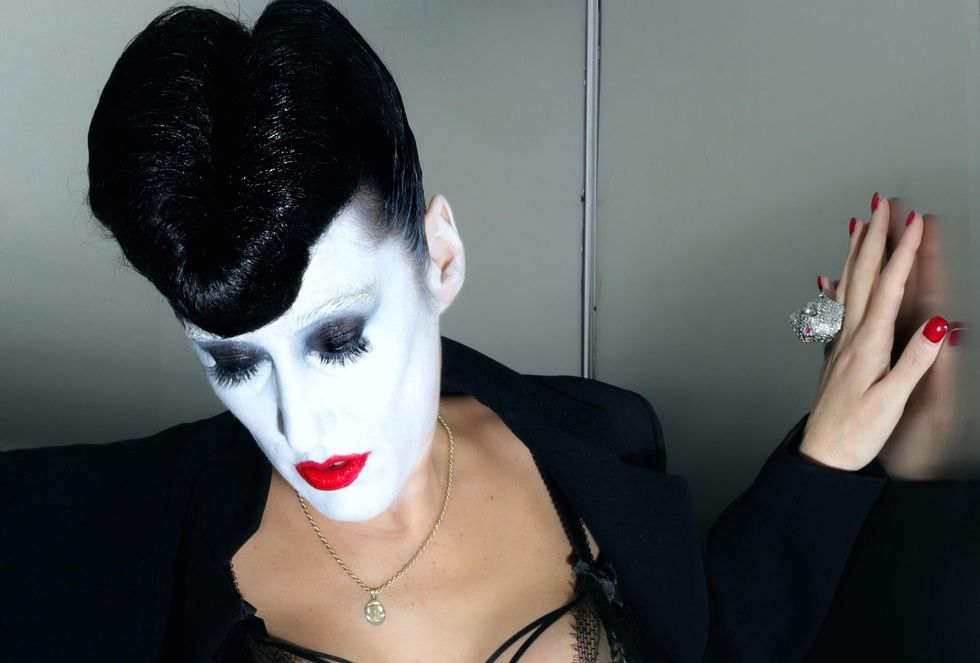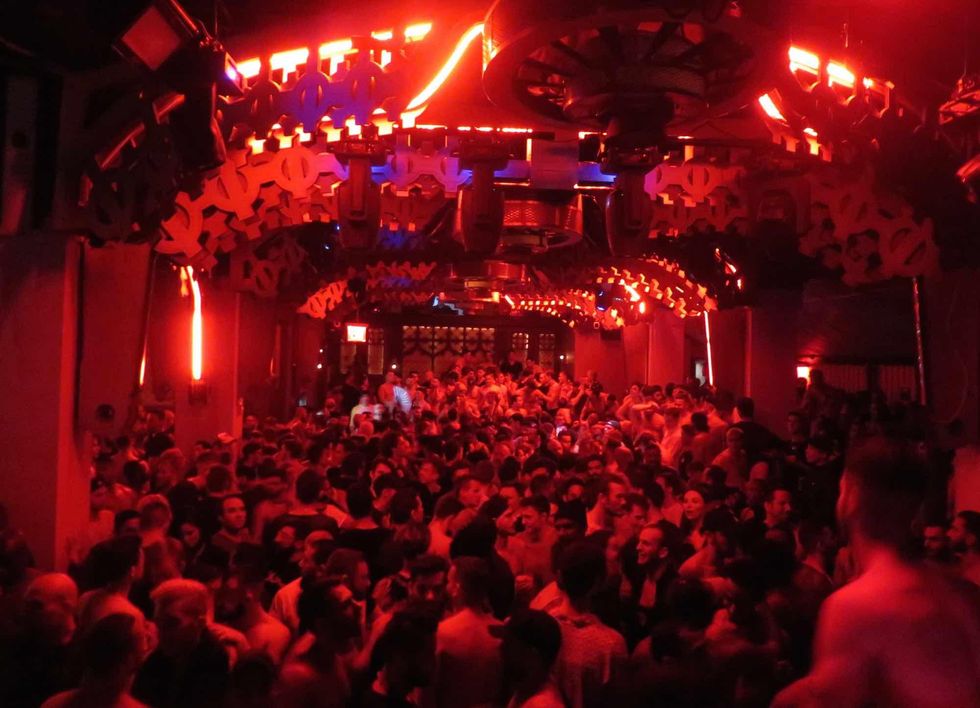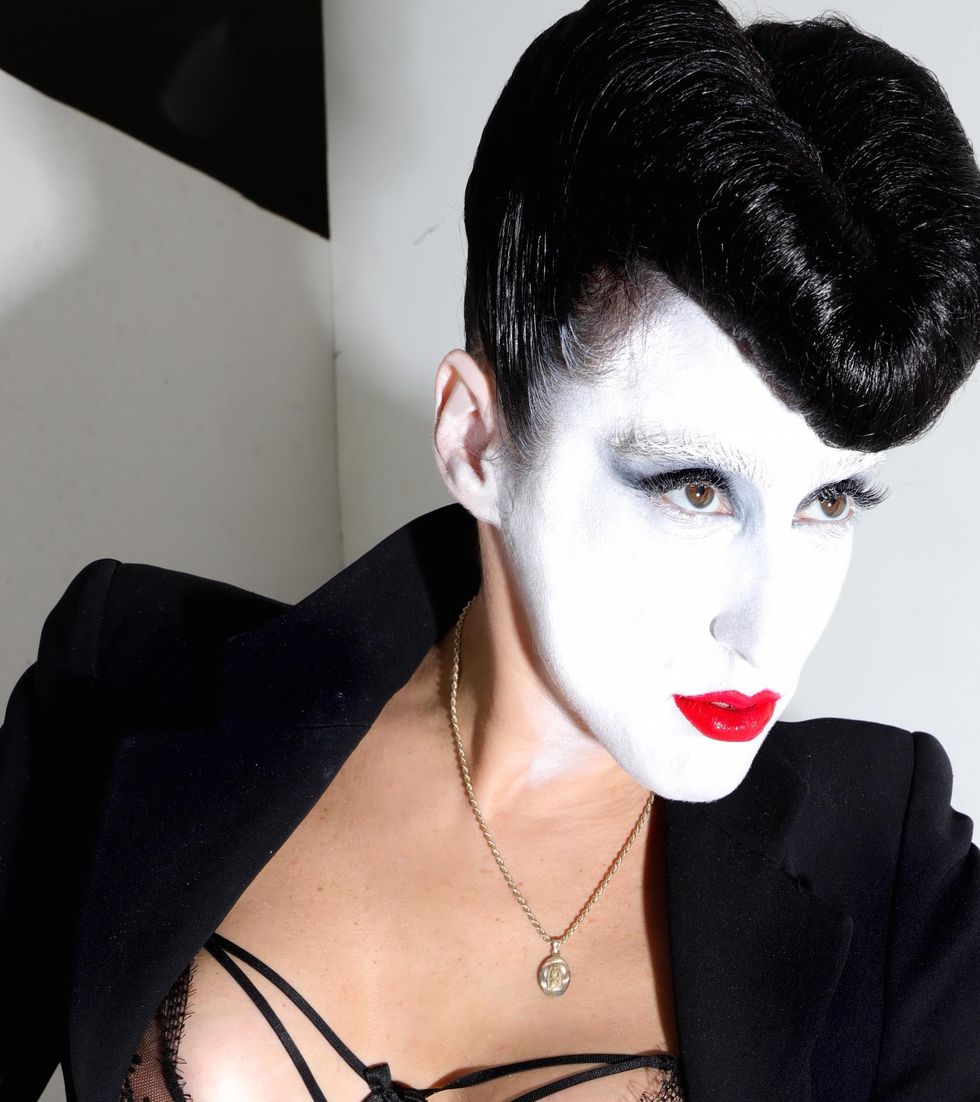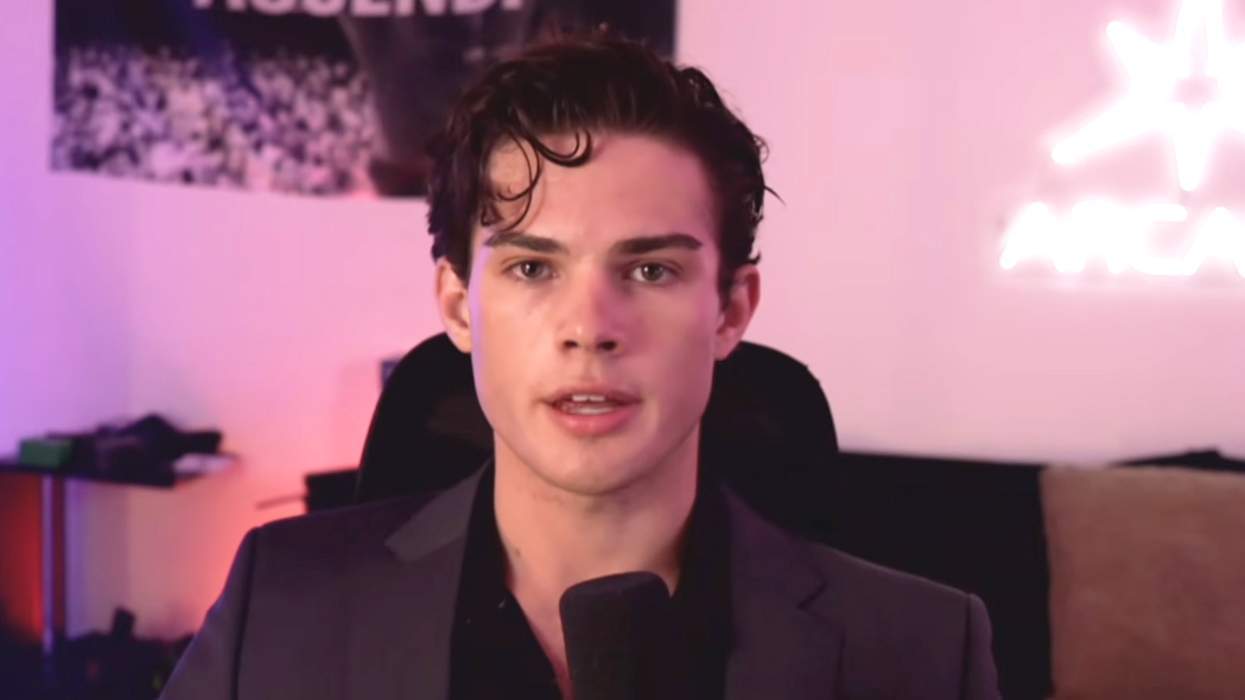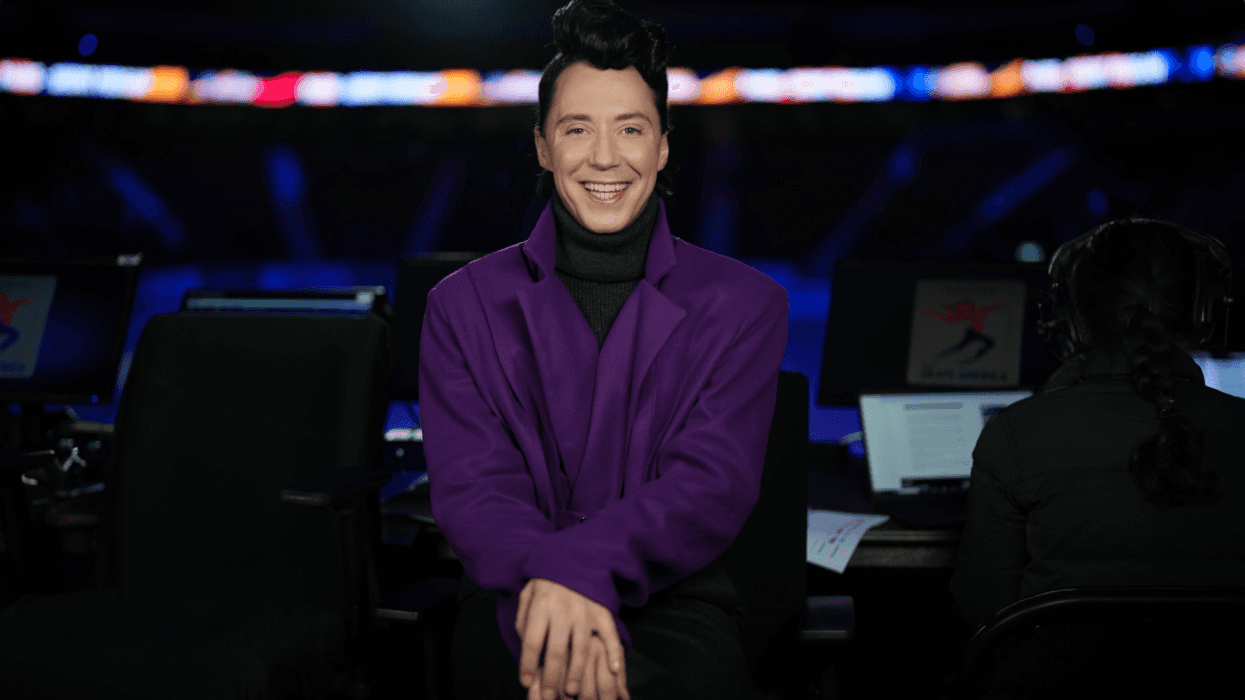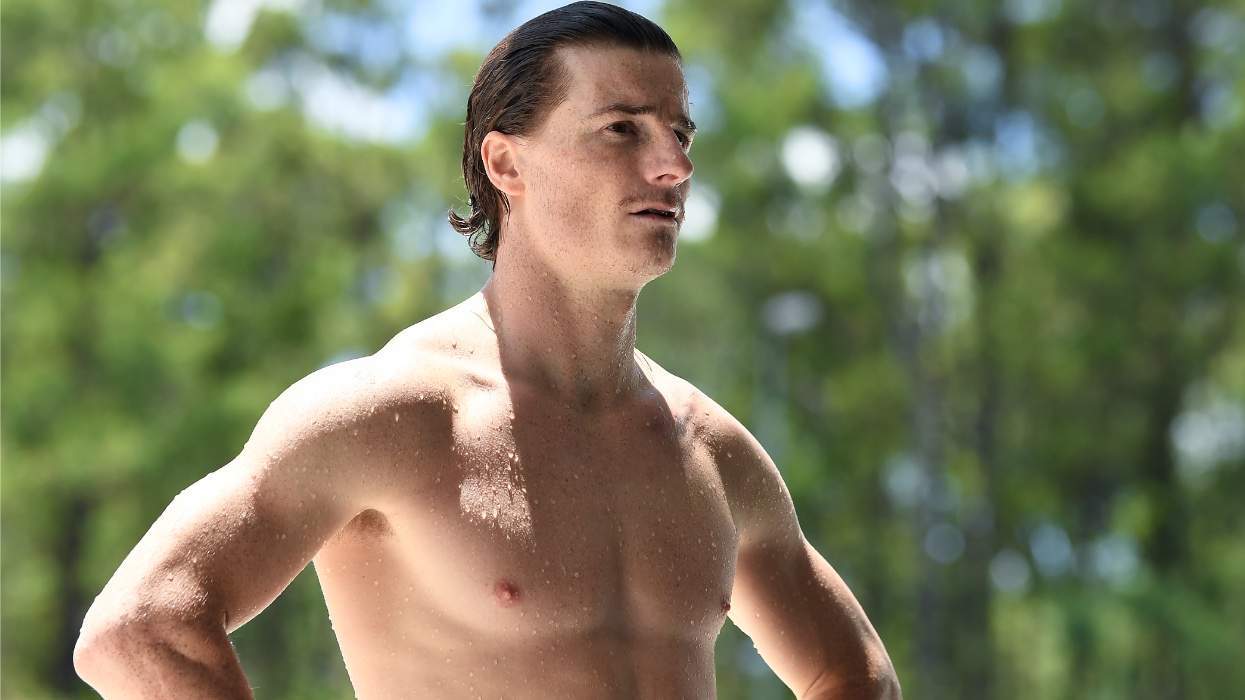It's unusually bright inside Battle Hymn, but that's the way Ladyfag wants it, if only for a few moments. It's just after midnight on June 13, 2016--the day after Orlando's Pulse nightclub shooting--and the high priestess of this other queer gathering, miles away in Chelsea, New York, has asked her team to bring the house lights up. Standing tall in an altar-like DJ booth that looks out on a sweaty sea of guests, Ladyfag takes the mic. "Look around you!" she says, sad but emboldened. "This is your community...this is a queer space...this is your fucking home!" Briefly pulled from the anonymity of darkness, shirtless muscle boys rub shoulders with polished drag queens and color-splashed club kids. There are tears and running mascara. In the next moment, Ladyfag asks the crowd of hundreds to join hands, and there's a pause for silence. "If it happens to them, it happens to us," she says of the Pulse victims. "We are all one. And tonight, we dance for them." In sync with Ladyfag, Honey Dijon, one of Battle Hymn's hallowed house DJs, slowly builds the soulful thump of her next set. And as the lights go down, the energy rises again, with people gyrating and cheering in mournful release.
Related | Gallery: Inside Ladyfag's Battle Hymn, The Best Queer Party in New York
"It was cathartic and it was one of the most special Battle Hymn nights," Ladyfag says. "It was a night when everyone was calling me like, 'Are we canceled?' And I was like, 'Of course we're not canceled. Where else would we go?' In small communities, when these things happen, you go to community centers or you go to your local church. We live in New York City, and we're all queer, so where do we go? We go to a nightclub. It's often our meeting ground. On that night, Battle Hymn wasn't going to close out of fear--the thought of everyone being at home alone seemed insane to me. And no one said that I had to say anything publicly, but I kind of felt like people wanted me to. When I looked out at that room and saw everyone holding hands and crying, I was reminded why I do this. People can say all sorts of things about nightlife and how empty it is, and how it's all about sex, drugs, and rock and roll, but there really is a community there."
And there's surely a unique one at Battle Hymn, which might be the only queer party in New York where it's not at all uncommon to hear its organizer address her crowd with profound, topical, and reassuring speeches (Ladyfag also spoke up in the wake of Trump's election and on Martin Luther King, Jr., Day, among other instances). Since it first opened on April 3, 2016, Battle Hymn has attracted a wildly diverse and inclusive clientele, from trans icon Amanda Lepore and designer Nicola Formichetti to everyday businessmen and jockstrap-clad circuit boys who might not be used to such a thoroughly woke atmosphere. It's that rare space where you can come as you are or fearlessly express your loudest self, and as the homemade looks of young creatives merge with the allure of high fashion, gender often disappears--just one way in which Battle Hymn can be a progressive microcosm of what many of us want the wider world to look like.
"One of my friends once told me, 'Battle Hymn is important to you because it's the only place where you can stand without hitting your face on an exit sign,'" says Magdalena Femanon, a young queer artist, actress, and Battle Hymn regular who's known for basing her lavish looks around two-foot stilts she wears on her feet. "I never feel limited in what I can bring to that party. Ladyfag produces a space where anyone who is down to love is welcome, and that's the kind of party I struggled to find when I first began going out. For example, I can come completely covered in latex and gold leaf with limited vision, or I can show up as a '90s chick with butterfly clips and a Tamagotchi in my ear. The environment allows for all of that."
It's also appropriate that the environment literally evokes a church. Though it's changed a bit in the approximate two years since Battle Hymn launched, Flash Factory, the venue that houses the party, has an ornate, cathedral-esque interior, originally complete with pews and stained-glass windows. Some of those features have recently been replaced or modernized, but there are still the massive stained-glass light fixtures (like the one that hovers above the main bar), and the sweeping, baroque ceiling details that stretch above the full expanse of the dance floor, as if the guests have formed their own next-gen congregation. According to Ladyfag, these architectural pieces were collected and repurposed from churches all across New York, and along with the sheer size of the space and the first-rate sound system, it's one of the perks that attracted her to come on board from the start--not to mention the special place that Sundays hold in the hearts of gay club-goers.
"I lived here in the early 2000s, when Sunday nights were always the big gay nights," says Ladyfag, who's been a nightlife promoter, producer, organizer, and icon in New York for 13 years. "Venues would never give Thursday, Friday, or Saturday nights to gay promoters because those nights were reserved for straight people. So Sundays became a thing, and there's a kind of magic to the Sunday party--if you're there, you're there for the music and the energy and because the vibe is really joyful. You're not just randomly coming off the street to get fucked up because it's Friday night. People used to joke, 'Oh, we're going to church on Sundays,' and everyone would refer to nightlife as church. This place was actually designed to look like one."
Still, she did have her initial doubts. "I worried about doing a weekly Sunday event in such a large space," Ladyfag says, "but at the same time, the space is amazing and I hadn't had any spaces that could really feel like your own. There are lots of big clubs, but many feel like there are men in suits barking at you everywhere--they don't feel like home. I would rather have a shitty space with a good team of managers and bar staff. But to have all of that in the same package, where I get to have an amazing team and a real, incredible sound system and incredible lighting, was just too good to pass up. I went [to Flash Factory] for a different party before I confirmed everything, just to see what it felt like. And even though it wasn't my crowd, I went in, I took the stage for half an hour, felt the party, and was like, 'I'll take it.'"
Ladyfag's connections and Flash Factory's amenities have since attracted sought-after DJs from across New York and across the world. In addition to Honey Dijon--a close friend of Ladyfag's who, during New York Pride last summer, spun for a whopping 12 straight hours at Battle Hymn, from 5 p.m. to 5 a.m.--there are fellow residents Eli Escobar and The Carry Nation, along with regular guests like Hex Hector and Todd Terry. "I don't feel like I meet too many people who really care about New York City nightlife as much as I do--who want it to be the best it can be and really believe in it," says Escobar. "I feel like Ladyfag definitely shares that passion with me. And that makes you want to DJ your ass off because you know she worked her ass off to make the party that much better than everything else going on. There have been some nights--especially since November 2016--where I've been so sad about the state of our country, and I've really felt the power of music and dancing, and their ability to serve as the ultimate release. It feels very necessary right now, and there have been major moments at Battle Hymn where I've witnessed that in all its glory."
Dijon adds, "For a long time now, most queer spaces in New York City have focused on pop music or hip-hop or drag entertainment. Music always seems to be an afterthought. I'm so happy that we have an actual party that focuses on music and a proper dance floor experience. Gay clubs used to be on the cutting edge of music and culture; however, mainstreaming and assimilation have diluted that. I'd like to think that Battle Hymn offers an alternative to the complaints that New York is dead because, as we see with this party, that is certainly not the case."
And, of course, in the current climate, there's also a certain satisfaction in seeing Ladyfag, a woman, at the helm of such a widely celebrated and game-changing enterprise. When she was coming up, Ladyfag's wild looks, her association with drag queens, and her own queerness resulted in people calling her "f****t" in the streets. And even after she overcame those slurs and parlayed them into a new name (she was born Rayne Baron, and "Ladyfag" organically stuck in the wake of her performance piece Ladyfag: A Love Story), she still had to stand up for herself in one of the countless male-dominated industries.
"It's a boy's game," she says. "In nightlife, most club owners are male, and every time I'd go for a meeting, I always used to bring someone with me because I felt like I wouldn't be taken as seriously as often. And I've had crazy things happen. When I ran Clubber Down Disco in New York, one of the owners came in and put his hand on my ass and it was a whole big thing. We had to ask him to leave and I thought I was going to lose the whole party because of it, but I basically told him to fuck off. These guys think they can intimidate me--all these club owners. You have to really remind yourself to stand tall. You have to know who you are, and not give a shit, and assert your power. It's not a business to cower in, and it's nice to be able to have succeeded in my own right and in my own way. And it's not always easy. Sometimes I walk into a room and I have to stand extra tall and talk the talk, and it can be taxing to have to do that. But I do it to make parties happen."
Appropriately, Ladyfag's assistant, Chaia Werger, is also a woman, and she's very much a part of the new queer guard that lights up Battle Hymn alongside Ladyfag's longtime collaborators like Lepore, Dijon, and artist Desi Santiago. "I was too young to experience New York club culture in the '90s," Werger says, "but many people have told me that Battle Hymn has that vibe--a magic that's been missing in more recent nightlife events. Lady and I have talked about that instant when you're at a party, and you look around, and all of a sudden you feel a spark, and you know this is something people will remember. At Battle Hymn, you feel that."
At a certain point, after a celebrated run of weekly Sunday revelry, Battle Hymn took a few hiatuses and then shifted to Fridays, in part to help draw in more guests and raise the party's income. The effort paid off, and more guests came in droves, but something about that "spark," as Werger calls it, or that beloved "church," as its headmistress describes it, went missing. Ladyfag felt it, the regulars felt it, and finally, this weekend, as Battle Hymn nears its two-year anniversary, the party will be returning to Sundays (continuing once a month), when only the truly committed family members will make the trek to rejoice.
"I think the magic of the party started to get a little lost on the Friday nights," Ladyfag says. "The crowd shifted and the vibe shifted and everyone could feel it. Battle Hymn was always supposed to be a mix of everybody, and then it kind of felt hijacked, and when a party's that special, you don't want to compromise it." She continues, "I love nightlife. It's not like I went to a club one night and went home and I was done. This has been my whole life, and I love the music, the pomp, and the people. There's nothing like all these amazing creative expressions coming together in one room and sharing energy. When Battle Hymn moved to Friday, I think the regulars felt like they lost that--like they lost their home. With the return to Sundays, we're giving it back to them."
Photographed exclusively for OUT by Marco Ovando.
Hair: Brian Buenaventura.
Makeup: Dawn Nicole.


